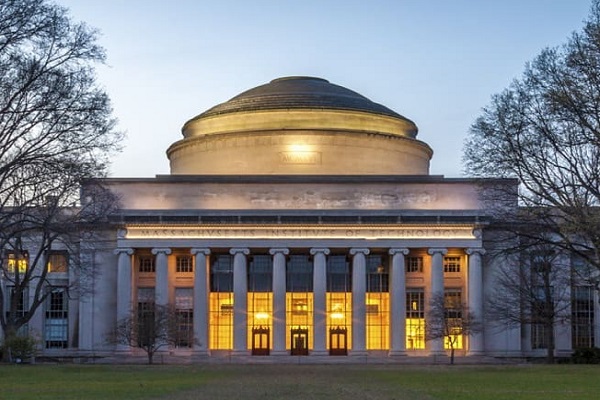Massachusetts Institute of Technology: Embarking upon a leadership journey
Current developments in the Middle East continue to challenge people in the region and open windows to make a sustainable impact. Challenges like water access, health care, IT, vocational training, and others can be addressed collaboratively with entrepreneurial and novel problem-solving capabilities. To do so, future leaders need to understand the challenges through a regional lens while learning how to collaborate across borders to develop potential solutions.
MIT International Science and Technology Initiatives (MISTI) combined 30 students, three Middle Eastern organizations, five industry leaders, and entrepreneurs to create “The Leader’s Journey: In Times of Transition and Crisis.” The program brought MIT students and young-to-mid-career Israelis and Palestinians together to address significant challenges in the Middle East.
David Dolev, managing director of MISTI’s programs in the Middle East, reached out to three organizations that he had partnered with in the past to explore new ways of connecting MIT with the region. Middle East Entrepreneurs of Tomorrow (MEET), Our Generation Speaks (OGS), and Tech2Peace brought together their alumni alongside leaders in the industry to help explore how multidisciplinary, transboundary cooperation can make an impact in the region. MISTI alumna Kathleen Schwind managed the project.
Speakers were eager to engage with the next generation of leaders. At the same time, participants had a chance to have deep conversations about these challenges, and their potential solutions, while employing the techniques and skills they had learned.
MIT alumni, each a leader in their field, talked about a topic related to leadership and entrepreneurship, and answered questions from the participants. The program drew from MISTI’s global network of industry leaders and organizations with attention to scientific, technological, and entrepreneurial efforts in the Middle East and the three organizations’ extensive work in the region.
Robin Chase, American entrepreneur and the co-founder and former CEO of Zipcar, spoke about building on excess capacity to create novel global solutions and strategies. Next, Rhiannon Menn, the founder of Lasagna Love, joined for her talk “From local to national in six months: How to mobilize the masses?”
Brewster Kahle, founder of the Internet Archive, shared his insights on how to leverage openness to move toward transformative change. Camille Richman, a MISTI alumna and co-founder of Hamama, spoke about “Impact-driven research to make sure you have the right product.” Christine Ortiz, Station1 founder and the Morris Cohen Professor of Materials Science and Engineering at MIT, rounded out the series with “How to make a transformative impact from within your organization.”
Breakout discussion groups followed, in which MIT, Israeli, and Palestinian participants met to complete a project that drew from the program sessions, their experiences in the program, and their individual backgrounds, to develop five “pillars” for making an impact in the region. These pillars were inspired by the sessions and the speaker topics, and aimed to build a platform upon which projects can be built in the future.
Specific ideas generated by the groups included: implementing a model in which excess solar energy is re-distributed to underserved regions, developing virtual workplaces to expand access to education and professional development opportunities, and addressing food waste through a research-execution-community-impact-maintenance model.
Graduates of the “Leader’s Journey” program said they felt better-equipped to create positive change in the region by collaborating with a diverse set of individuals over new methods and ways of thinking.
“I learned how much knowledge we have as a group — even if we sit for one hour to talk about a topic we are passionate about, we can create amazing things together,” one student said.
Participants noted that one of the program’s most significant assets was the creation of a unique space to hold deep conversations with peers from a variety of backgrounds and interests. This space also allowed participants to contextualize and put into action the skills and feedback from the speakers. Participants also said they were inspired by learning from new people and felt more confident about turning their ideas into ventures, businesses, and positive community impact.
“During the past months, we were lucky to be part of this program and get this special opportunity to meet great entrepreneurs who did great work toward the global community, not only their local community,” shared one group of students. “We fed our minds with great knowledge to develop ourselves and our communities. A special thanks to the Leader’s Journey team for all of that.”
“Overall, the program served as an opportunity for participants to learn from each other and consider their personal and professional goals in a multidisciplinary and international capacity, work in international and multidisciplinary teams, and sharpen their global leadership skills,” said Dolev. “They were exposed to novel ideas from industry leaders, learned to frame those ideas in reality through conversations with fellow MIT students and Israeli and Palestinian peers, and learned how to turn those ideas into solutions in a changing and dynamic climate.”
The quality and relevance of the ideas produced inspired MISTI and the three organizations to make this an annual course which will be offered to MIT students this spring as a three-credit discovery course, SP.258 (MISTI: Middle East Cross-border Development and Leadership), which is open to all undergraduate and graduate students. Many attendees were so positive about their experience in the program they asked to be involved in the planning for next year.
“We are committed to working with our students to develop deeper understanding into how culture and regional factors impact our capacity to develop global solutions; connecting them to one another and building networks of future leaders; and enabling them to learn from current industry leaders and entrepreneurs. These three pillars will be their launching pad to collaborate with their peers around the world and together be the global change-makers the world deeply needs,” said Dolev.

